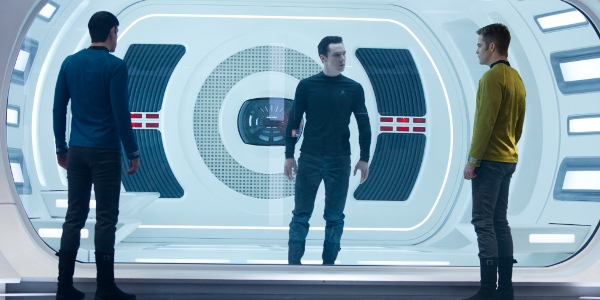Into The Woods (2015)
January 13, 2015 Leave a comment
 When a witch (Meryl Streep) reveals an historic curse lies on the Butcher (James Corden) and his wife (Emily Blunt), preventing them from having children, they are given a chance to reverse it so that they might finally start a family. Tasked with obtaining a cow as white as milk, a cape as red as blood, hair as yellow as corn and a slipper as pure as gold, the pair set off into the woods. Meanwhile, across the kingdom, a young girl (Lilla Crawford) crosses an inquisitive wolf, farmhand Jack (Daniel Huttlestone) sells his mother’s cow for supposedly magic beans and skullery maid Cinderella (Anna Kendrick) attends Prince Charming’s (Chris Pine) Festival. As her items are collected for her, the witch attempts to prevent adopted daughter Rapunzel (MacKenzie Mauzy) from finding a prince of her own.
When a witch (Meryl Streep) reveals an historic curse lies on the Butcher (James Corden) and his wife (Emily Blunt), preventing them from having children, they are given a chance to reverse it so that they might finally start a family. Tasked with obtaining a cow as white as milk, a cape as red as blood, hair as yellow as corn and a slipper as pure as gold, the pair set off into the woods. Meanwhile, across the kingdom, a young girl (Lilla Crawford) crosses an inquisitive wolf, farmhand Jack (Daniel Huttlestone) sells his mother’s cow for supposedly magic beans and skullery maid Cinderella (Anna Kendrick) attends Prince Charming’s (Chris Pine) Festival. As her items are collected for her, the witch attempts to prevent adopted daughter Rapunzel (MacKenzie Mauzy) from finding a prince of her own.
Adapted from James Lapine and Stephen Sondheim’s musical of the same name, Rob Marshall’s Into The Woods arrives at a time when crossovers are very much in vogue. A mash-up of several Brothers Grimm stories including Little Red Riding Hood, Cinderella, Jack and the Beanstalk and Rapunzel, the film imagines what might happen after the requisite happy ever afters. Although for the most part faithful to the musical, Sondheim approved a number of small changes at Disney’s behest, toning down the violence and removing references to Snow White and Sleeping Beauty (who previously appeared as adulteresses). A far more intrusive influence can be felt in the austerity, with the studio having given Marshall only $50 million to play with. That’s not an awful lot when your film features a witch, two giants and — most expensively of all — a million dollars worth of Johnny Depp.
Nevertheless, his otherwise budget cast (and as good as James Cordon is as the film’s male lead there’s no denying he’s value for money) more than compensates for the occasionally unconvincing CGI. Streep is obviously spectacular as the witch, and dominates whenever she is onscreen, but she still leaves plenty of room for everyone else to shine. Even with so many cut Into The Woods contains countless musical numbers, with each actor getting at least one song to relish. Blunt and Kendrick delight as the Butcher’s wife and Cinderella, while Pine and Billy Magnussen (as Rapunzel’s unlucky prince) play off one another beautifully during their showstopping and waterfall-impeding duet. Arguably the biggest pleasure, however, comes from watching the various stage actors outperform their big screen counterparts: both Daniel Huttlestone (previously seen in Tom Hooper’s Les Miserables) and Tony-winning newcomer Lilla Crawford bring down the house as Jack and Little Red Riding Hood respectively. Only Frances de la Tour disappoints, though it’s hardly her fault.
Unfortunately, for all of its energy and flourish, Into The Woods just doesn’t work as drama. Lapine (who wrote the film’s screenplay) confidently adapts the Grimm fairy-tales, but he struggles with his own alternative endings. Whereas the musical killed most of the supporting cast off the film keeps them alive for no apparent reason, while the deaths that remain are almost equally meaningless. Nobody suffers more than Rapunzel, who is saddled with the most backstory (actually the Baker’s sister, she was kidnapped by the witch as a baby) only to be ignored when it should be paying dividends. Meanwhile, as much fun as it is to watch the Butcher and his wife interfere with such familiar stories none of the other characters’ interactions work particularly well, and the alliance of the Baker, Cinderella, Jack and Little Red Riding Hood in the final act is neither iconic or iconoclastic. If anything, it’s even more archaic than the source stories, with the women hiding and looking after the baby while the men climb a tree to slay a giant. Anna and Elsa are nowhere to be seen.
Although often on fine form, there is an inconsistency to Into The Woods — lyrically as well as narrively — that ultimately undermines its success. Neither as camp as Mamma Mia! or as stirring as Les Miserables, it’s never clear whether Marshall is playing his film for laughs or taking it all seriously. With such uncertain direction, it’s no wonder his characters spend so much time lost in the woods.













